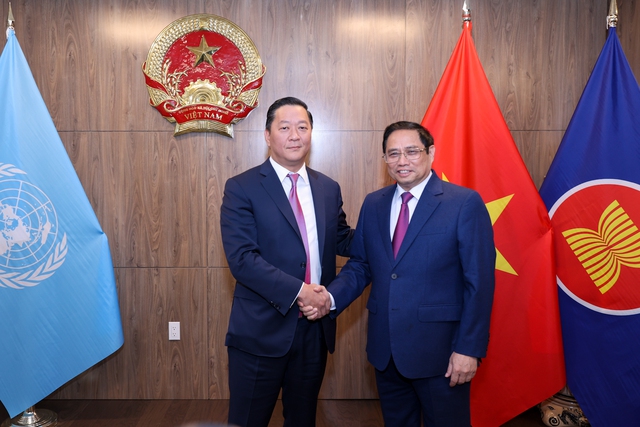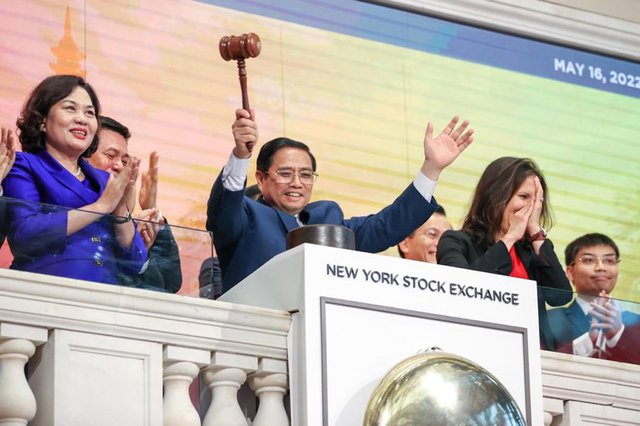US financial groups seek to expand Vietnam interests

Prime Minister Pham Minh Chinh (R) meets with KKR CEO Joseph Bae in Washington, D.C. on May 16, 2022. Photo courtesy of the Government Portal.
Leaders of top U.S. financial corporations have expressed interest in expanding investment in Vietnam.
The comments were made at their meetings with Vietnam’s Prime Minister Pham Minh Chinh in Washington D.C. on May 16, local time, during his working trip to the U.S.
Joseph Bae, CEO of KKR Fund, said the global investment firm intended to expand into diverse fields in Vietnam like real estate, infrastructure, digital transformation, food, consumer goods, and technology.
KKK Fund, one of the world's biggest private investment funds, has invested more than $1 billion in three Vietnamese companies, namely Vingroup’s Vinhomes, Masan Group’s Masan MEATLife Company, and Equest Education Group.
The CEO rated Vietnam as a very appealing market for investors given the government's favorable policies, its important geographical position, and youthful and energetic population.
The comprehensive partnership between Vietnam and the U.S. will also create favorable conditions for investment activities, Bae added.
The prime minister praised KKR's efforts to enlarge its footprint in Vietnam. "Despite the pandemic, Vietnam's start-up companies attracted around $1.3 billion in investment capital in 2021, an all-time high," he noted.
Chinh said Vietnam expected to receive KKR's support in policy consultancy, technical issues, and human resource training in the coming time.
In a separate meeting on the same day, Alfred Kelly, Chairman and CEO of Visa, highly valued the plan and development of cashless payments in Vietnam. With the growth rate tripling from 8% in 2020 to 28% this year, Visa believed that the Vietnamese government will achieve its cashless payment targets set by 2027.
Visa, the world's leading digital payments group, has maintained its engagement in the development and application of online payments in Vietnam for over 20 years. Visa card was first accepted by Vietnamese retailers in 1995, and the first Visa credit card was issued two years later.
Chinh said he appreciated Visa's presence for many years, and urged the group to make investment expansion, new product research and development, deeper engagement with Vietnamese commercial banks, and further contribution to digital transformation and development of Vietnam's financial system.
During the meeting, Chinh assured representatives from Standard & Poor's (S&P's) that Vietnam is working hard to build a safe, transparent, effective, and sustainable capital market. He solicited S&P's aid in credit rating Vietnamese firms.
The prime minister discussed with Citigroup executives the possibilities of increasing non-cash payment cooperation, developing capital markets, reacting to climate change, and transitioning to a low-carbon economy.
On the same afternoon, Chinh visited and rang the bell to end the trading session at the New York Stock Exchange (NYSE).

The PM rings the bell to end the trading session at the New York Stock Exchange on May 15, 2022. Photo courtesy of the government's portal.
He also attended the awarding ceremony of two cooperation documents in the fields of finance, banking, and investment funds between Vietnamese and U.S. partners. One of them was a cooperation deal between Vietnam’s State Securities Commission and the NYSE on supporting market upgrading and building a mechanism for investors to engage in the two securities markets.
On May 15, local time, the Vietnamese prime minister met with Charles Kaye, CEO of Warburg Pincus, one of the world's oldest and largest private equity funds.
Vietnam has become Warburg Pincus's third-largest investment destination in Asia, trailing China and India. Nearly $2 billion has been poured into numerous Vietnamese companies since 2013, including Vingroup’s joint ventures, VinaCapital, Techcombank, Becamex, MoMo e-wallets, Ho Tram Resort, and Metropole Hanoi.
The CEO outlined the company's objectives to further invest in Vietnam’s real estate market, as well as some problems and obstacles encountered while constructing the Ho Tram project in Ba Ria-Vung Tau.
Chinh noted he believed Warburg Pincus' expansion into the Vietnamese real estate market was both appropriate and opportune. The fund's global customer network will serve as a link to lure U.S. and other foreign investors to Vietnam.
Warburg Pincus CEO said that Vietnam's increasingly stable business and macroeconomic environment is favorable for foreign investors, but several areas need to be improved, such as infrastructure.
The fund is seeking to raise foreign ownership in Vietnamese commercial banks beyond the present 30% restriction, which has been repeatedly mentioned by foreign investors but has yet to be addressed.
- Read More
Indonesia to deepen role in global semiconductor supply chain
Indonesia is rolling out efforts to identify opportunities and map its natural resources to support the semiconductor industry, as part of a broader strategy to build domestic industrial capacity.
Southeast Asia - Sat, December 20, 2025 | 9:36 am GMT+7
Indonesia to stop rice imports next year
Indonesia will not import rice for either consumption or industrial use next year, citing sufficient domestic production, according to a government official.
Southeast Asia - Sat, December 20, 2025 | 8:00 am GMT+7
Northern Vietnam port city Hai Phong charts sustainable growth path for free trade zone
The establishment of Hai Phong Free Trade Zone (FTZ) is a strategic direction that will elevate the role and position of Vietnam in general and Hai Phong in particular within the global value chain, heard a conference held in the northern port city last week.
Economy - Fri, December 19, 2025 | 8:12 pm GMT+7
Construction begins on $32.5 bln Red River Scenic Boulevard project in Hanoi
The gigantic project Red River Scenic Boulevard, with a preliminary investment of about VND855 trillion ($32.49 billion) in Phu Thuong ward, Hanoi, broke ground on Friday.
Real Estate - Fri, December 19, 2025 | 4:57 pm GMT+7
Major Vietnamese groups kick off mega projects in south-central Vietnam
Vingroup, BIN Corporation, Hoa Phat, and FPT simultaneously broke ground on large-scale projects in south-central Vietnam on Friday, raising expectations for new national growth momentum in the coming period.
Economy - Fri, December 19, 2025 | 4:36 pm GMT+7
Mega-airport Long Thanh in southern Vietnam welcomes first passenger flights
The first passenger flights touched down at Long Thanh International Airport in Dong Nai province on Friday morning, marking the inaugural civil aviation operation at Vietnam’s largest airport.
Economy - Fri, December 19, 2025 | 2:07 pm GMT+7
Vingroup starts work on $35.2 bln Olympic Sports Urban Area on Hanoi outskirts
Vingroup (HoSE: VIC), Vietnam's leading private conglomerate, on Friday broke ground on its 9,171-hectare Olympic Sports Urban Area project in Hanoi, which is expected to become a new growth engine for the southern part of the capital in the next decade.
Real Estate - Fri, December 19, 2025 | 1:59 pm GMT+7
Vietnam telecom giant VNPT establishes AI company
State-owned Vietnam Posts and Telecommunications Group (VNPT) on Thursday launched subsidiary VNPT AI, aiming to bring Vietnamese AI products to international markets.
Companies - Fri, December 19, 2025 | 11:50 am GMT+7
Quang Ngai Sugar develops sugar, biomass power projects worth $179 mln in central Vietnam
Quang Ngai Sugar JSC (UPCom: QNS), a top sugar producer in Vietnam, will simultaneously hold groundbreaking or inauguration ceremonies on Friday for three projects worth over VND4.7 trillion ($178.5 million) in Gia Lai province.
Companies - Fri, December 19, 2025 | 8:05 am GMT+7
Vietnam defeat Thailand to win men’s football gold at SEA Games 33
After conceding two goals in just over 30 minutes, Vietnam reversed the situation to finally beat host nation Thailand 3-2 in the men’s football final of the 33rd SEA Games.
Travel - Thu, December 18, 2025 | 10:43 pm GMT+7
Sun Group to commence construction on 5 landmark projects worth $5.7 bln
Sun Group is scheduled to start construction of five large-scale projects across Vietnam’s three regions on Friday, with a total investment of nearly $5.7 billion.
Companies - Thu, December 18, 2025 | 8:39 pm GMT+7
Unpaid credit card balances in Singapore hit record high in 10 years
Singapore's credit card debt has exceeded SGD9.07 billion (about $7 billion) in 2025's third quarter, a 10-year high that was last seen in 2014.
Southeast Asia - Thu, December 18, 2025 | 7:54 pm GMT+7
Thailand, Japan deepen transport, infrastructure cooperation
Thai Deputy Prime Minister and Minister of Transport Phiphat Ratchakitprakarn has met with Japanese Ambassador Otaka Masato to advance cooperation in Thailand’s transportation and infrastructure projects.
Southeast Asia - Thu, December 18, 2025 | 7:50 pm GMT+7
Masan's FMCG arm MCH to list on HCMC bourse at $8 per share, valuation tops $8.6 bln
Masan Consumer Corporation (UpCoM: MCH), the fast-moving consumer goods arm of Vietnam’s Masan Group, will officially debut on the Ho Chi Minh City Stock Exchange (HoSE) on December 25, with a reference price set at VND212,800 ($8.08) per share.
Companies - Thu, December 18, 2025 | 4:57 pm GMT+7
Sun Group-led consortium to build $616 mln Red River bridge in Hanoi
Hanoi authorities have approved a consortium led by Sun Group as the investor for the Tran Hung Dao bridge project, with a total investment estimated at VND16.27 trillion ($616.14 million).
Infrastructure - Thu, December 18, 2025 | 3:26 pm GMT+7
Shinhan Bank Vietnam accompanies SMEs in promoting cashless payments
With modern, secure and convenient payment solutions designed to meet the specific needs of businesses, particularly the SME segment, Shinhan Bank Vietnam continues to accompany enterprises in building a modern corporate image and keeping pace with the digital economy.
Banking - Thu, December 18, 2025 | 2:10 pm GMT+7


























